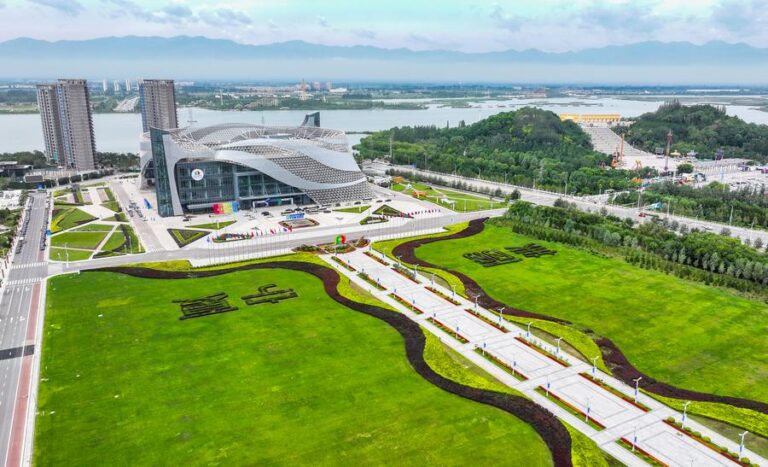* Themed “Innovation, Green Development, Prosperity,” the seventh China-Arab States Expo opened on Thursday in Yinchuan, northwest China’s Ningxia Hui Autonomous Region.
* The event features trade dialogues and exhibitions in traditional areas like economy, energy and agriculture, while covering emerging fields such as green development, healthcare and smart technology.
* The expo has fostered exchanges and cooperation between enterprises on both sides, significantly advancing high-quality Belt and Road cooperation between China and the Arab world.
YINCHUAN, Aug. 29 (Xinhua) — At an expo in northwest China’s Ningxia Hui Autonomous Region, visitor Liu Shaokun and her 10-year-old daughter watched in awe as a robot swiftly prepared a steaming Jianbingguozi, a savory Chinese crepe, in just three minutes.
“The crepe tastes fairly good. Technology is really changing our lives,” said Liu, who hails from the regional capital Yinchuan.
Themed “Innovation, Green Development, Prosperity,” the seventh China-Arab States Expo opened on Thursday in Yinchuan. The four-day event features trade dialogues and exhibitions in traditional areas like economy, energy and agriculture, while covering emerging fields such as green development, healthcare and smart technology.
First held in 2013, the biennial expo has become an important platform for China and the Arab states to promote pragmatic cooperation and advance high-quality collaboration under the Belt and Road Initiative (BRI).
Trade between China and members of the Arab League reached 1.72 trillion yuan (about 242 billion U.S. dollars) during the first seven months of 2025, setting a record for this period and rising 3.2 percent year on year. Bilateral trade has expanded steadily in recent years, with China remaining the bloc’s largest trading partner for several consecutive years, according to the General Administration of Customs of China.
“The BRI, as well as the China-Arab and China-Africa cooperation platforms, have proven that connectivity and open cooperation are the best paths to achieving common development,” Somali Prime Minister Hamza Abdi Barre said at the opening ceremony.
INNOVATION-DRIVEN DEVELOPMENT
In addition to established sections of clean energy and cross-border e-commerce, this year’s event has introduced a new exhibition zone on the digital economy and AI, responding to Arab states’ growing demand for AI, cloud computing and digital industries.
Gu Lidong, vice president of the company that developed the crepe-making robot, said the company uses AI and visual recognition technologies to guide the robotic arm, replicating the entire process of making crepes by hand.
“By attending the expo, we hope to promote our catering robots to Arab countries and the wider world, spreading Chinese culinary culture globally,” he added.
Since 2015, the expo has unveiled over 1,300 advanced technology applications, facilitating the signing of more than 100 technology cooperation agreements.
Many new technologies and products in emerging fields such as AI, gaming and smart meteorology will be displayed this year to support deeper China-Arab collaboration in science and technology.
GREEN PATH TO FUTURE
The first-ever green power zone showcased at this year’s expo offers visitors a firsthand look at how green electricity is generated and used.
Through the expo, Ningxia Wozhiyuan Technology Co., Ltd., specializing in technological innovation for resource recycling in arid regions, has introduced its core technologies to nine countries, including Oman, Egypt and Qatar.
By integrating PV power generation, intelligent water recycling, precise environmental control and high-efficiency cultivation techniques, the company has transformed what was once saline wasteland into a year-round “digital vegetable garden” in Ningxia.
“With the use of green energy, the smart control not only improves crop quality but also saves over 20 percent of water compared to traditional greenhouses and boosts income more than threefold,” said Sun Zhaojun, chairman of the company.
Since 2015, China has trained over 1,000 skilled professionals in green development for 22 Arab countries, while also attracting young scientists from Arab nations to work in China. More than 30,000 hectares of desert in Arab states have been restored using Chinese technology.
On the investment front, Chinese companies have established multiple industrial parks in countries like Egypt, the United Arab Emirates and Saudi Arabia. Meanwhile, investments from Arab enterprises have also poured into China’s petrochemical, new energy and technology sectors.
Yuan Xiaoming, assistant minister of commerce, said the China-Arab States Expo has fostered exchanges and cooperation between enterprises on both sides, significantly advancing high-quality Belt and Road cooperation between China and the Arab world.
(Video reporter: Lyu Ze; video editors: Wu Yao and Li Qin) ■

